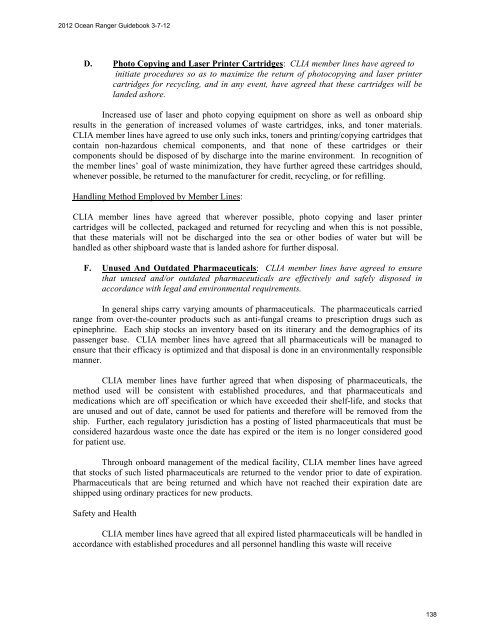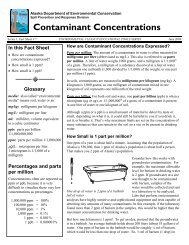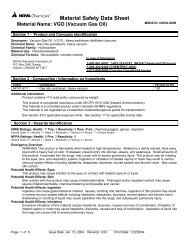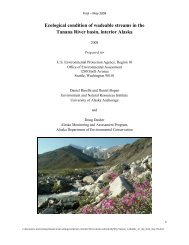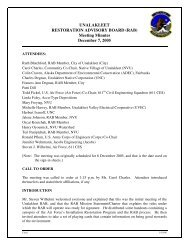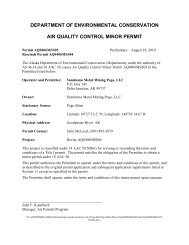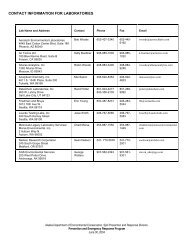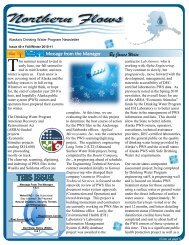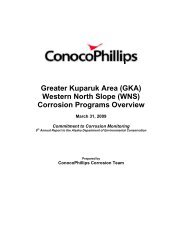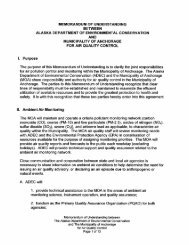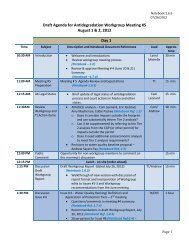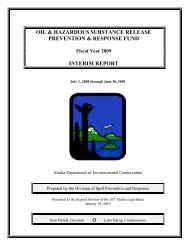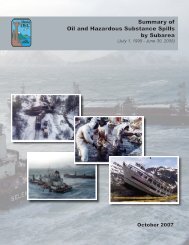2012 Ocean Ranger Guidebook Revision 3-7-12 - Alaska ...
2012 Ocean Ranger Guidebook Revision 3-7-12 - Alaska ...
2012 Ocean Ranger Guidebook Revision 3-7-12 - Alaska ...
Create successful ePaper yourself
Turn your PDF publications into a flip-book with our unique Google optimized e-Paper software.
<strong>20<strong>12</strong></strong> <strong>Ocean</strong> <strong>Ranger</strong> <strong>Guidebook</strong> 3-7-<strong>12</strong><br />
D. Photo Copying and Laser Printer Cartridges: CLIA member lines have agreed to<br />
initiate procedures so as to maximize the return of photocopying and laser printer<br />
cartridges for recycling, and in any event, have agreed that these cartridges will be<br />
landed ashore.<br />
Increased use of laser and photo copying equipment on shore as well as onboard ship<br />
results in the generation of increased volumes of waste cartridges, inks, and toner materials.<br />
CLIA member lines have agreed to use only such inks, toners and printing/copying cartridges that<br />
contain non-hazardous chemical components, and that none of these cartridges or their<br />
components should be disposed of by discharge into the marine environment. In recognition of<br />
the member lines’ goal of waste minimization, they have further agreed these cartridges should,<br />
whenever possible, be returned to the manufacturer for credit, recycling, or for refilling.<br />
Handling Method Employed by Member Lines:<br />
CLIA member lines have agreed that wherever possible, photo copying and laser printer<br />
cartridges will be collected, packaged and returned for recycling and when this is not possible,<br />
that these materials will not be discharged into the sea or other bodies of water but will be<br />
handled as other shipboard waste that is landed ashore for further disposal.<br />
F. Unused And Outdated Pharmaceuticals: CLIA member lines have agreed to ensure<br />
that unused and/or outdated pharmaceuticals are effectively and safely disposed in<br />
accordance with legal and environmental requirements.<br />
In general ships carry varying amounts of pharmaceuticals. The pharmaceuticals carried<br />
range from over-the-counter products such as anti-fungal creams to prescription drugs such as<br />
epinephrine. Each ship stocks an inventory based on its itinerary and the demographics of its<br />
passenger base. CLIA member lines have agreed that all pharmaceuticals will be managed to<br />
ensure that their efficacy is optimized and that disposal is done in an environmentally responsible<br />
manner.<br />
CLIA member lines have further agreed that when disposing of pharmaceuticals, the<br />
method used will be consistent with established procedures, and that pharmaceuticals and<br />
medications which are off specification or which have exceeded their shelf-life, and stocks that<br />
are unused and out of date, cannot be used for patients and therefore will be removed from the<br />
ship. Further, each regulatory jurisdiction has a posting of listed pharmaceuticals that must be<br />
considered hazardous waste once the date has expired or the item is no longer considered good<br />
for patient use.<br />
Through onboard management of the medical facility, CLIA member lines have agreed<br />
that stocks of such listed pharmaceuticals are returned to the vendor prior to date of expiration.<br />
Pharmaceuticals that are being returned and which have not reached their expiration date are<br />
shipped using ordinary practices for new products.<br />
Safety and Health<br />
CLIA member lines have agreed that all expired listed pharmaceuticals will be handled in<br />
accordance with established procedures and all personnel handling this waste will receive<br />
138


